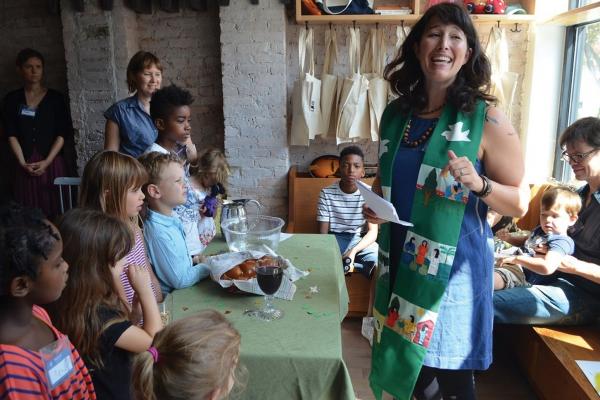Last year, St. Lydia’s church in Brooklyn, N.Y., started a monthly service that lifts up children’s leadership and participation. They call it Waffle Church, and it’s messy on purpose. Olivia Whitener, an editorial assistant at Sojourners , interviewed Waffle Church minister Sarah McCaslin in January about the service that revolves around songs, stories, maple syrup, and the love of Jesus.
Sojourners: Why waffles?
Rev. Sarah McCaslin: Well, I prefer a savory brunch option, if given the choice. But “Omelet Church” just doesn’t have the same ring. The fact of the matter is: Who doesn’t love a waffle? They’re easy to make, they’re delicious. But the waffles aren’t as important as the idea of this meal we share around the table. It isn’t that we’re going to church and then will have waffles. When we sit around the table together and fellowship together, it’s an extension of communion.
What’s special about a Waffle Church service? The first time we did Waffle Church, I was standing at the table, and I do a rhetorical-question-style liturgy: “Look, we are gathered around this table, and we set it with our finest. This is not the Lutheran table, it’s not St. Lydia’s table, it’s not Waffle Church’s table. Whose table is this?” Then a 6-year-old shouts, “It’s the Lord’s table!” We couldn’t have planned it, and it was just amazing. Of course, now we have to do it because there’s always the kid who wants to shout “It’s the Lord’s table!” And so here’s a piece of the liturgy that has been fixed because the children will demand it. That kind of stuff is just happening all the time.
Are there ways other churches can incorporate a Waffle Church service into their ministries? I think it’s about creating a physical space that can accommodate the needs of children. The music is the other major piece of it. At St. Lydia’s, we adhere to the paperless-music singing tradition, where all of the songs are taught. So there’s no hymnal, no lyrics to be read—those things tend to privilege literacy. This way, children and adults can participate in the music each and every week.
Read the Full Article

